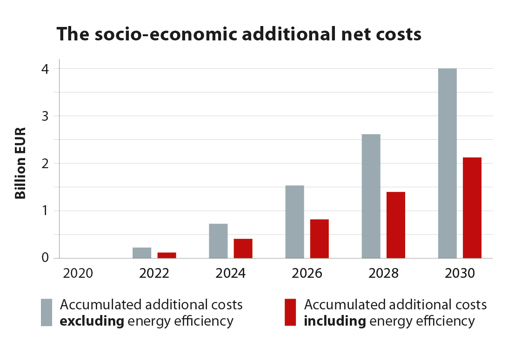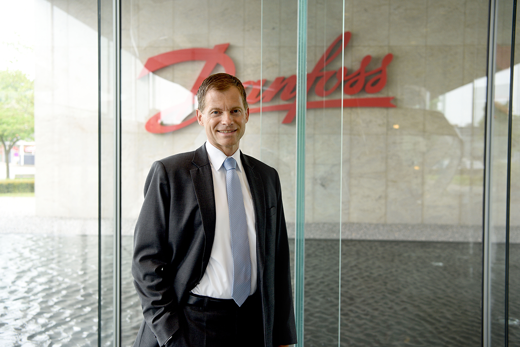
Achieving almost all the government's goal of a 70 percent reduction in CO2 emissions by 2030 with existing solutions is possible. However, if this is to be done as cheaply as possible, it will require targeted investments in energy efficiency, sector coupling and renewable energy, according to a new analysis from EA Energy Analyses.
In order to implement the green transition as quickly and as cheaply as possible, there needs to be just as much targeted investment in energy-efficient solutions as in sector coupling and renewable energy. This is the conclusion of EA Energy Analyses based on a new analysis, which suggests that energy-efficient solutions could save society a total cost of around DKK 14 billion (EUR 1.9 billion) leading up to 2030.
EA Energy Analyses concludes that the price for achieving a 66 percent reduction of CO2 emissions by 2030 will result in a further investment of around DKK 16 billion (EUR 2.15 billion) in addition to those activities and investments that have been agreed as part of Denmark's 2018 Energy Agreement. The analysis also shows however that this cost will increase to around DKK 30 billion (EUR 4 billion) if no investments are made in initiatives to reduce energy consumption.
"There continues to be great potential in Denmark for saving energy, including in the heating of buildings and in industrial production. The cheapest and cleanest energy is the one we don't use, which is why the transition to a sustainable energy consumption begins with investments in energy efficiency. As EA Energy Analyses points out, society can save a lot of money by first prioritizing investments in energy efficiency," says Kim Fausing, Danfoss CEO.

Technology and solutions already exist
The big socio-economic savings potential in investments in energy efficiency are due to a much smaller need to invest in an expansion of the electricity grid or energy storage as well as lower costs for fuel and energy. The lower energy consumption in one place, frees energy for the use in sector coupling and power-to-X technology, which is necessary to achieve the goal of the green transition.
"The technology and the solutions to harvest the potential in energy efficiency already exist. This is why it's so important that investments in wind and solar power go hand in hand with investments in energy efficiency and sector coupling. It makes sense for the climate as well as socio-economically. By prioritizing all three areas, we can achieve the ambitious political goal while also ensuring that it takes place as cost-effectively as possible. This enables us to reduce the costs of the green transition, while also releasing resources for other political priorities," says Kim Fausing, Danfoss CEO.
About the analysis and the potential in energy efficiency
EA Energy Analyses' calculations show that the cheapest model for achieving a 66 percent reduction of CO2 emissions would result in necessary investments corresponding to DKK 175 billion (EUR 23.4 billion) in electrification and sector coupling initiatives, energy efficiency and the production of renewable energy. Of this, DKK 23 billion (EUR 3 billion) would be investments in energy efficiency. If investments are not made in energy efficiency and one invests solely in a green transition through renewable energy, electrification and sector coupling, the total additional costs of achieving a 66 percent reduction increase to around DKK 207 billion (EUR 27.7 billion).
Through an optimal investment in energy efficiency and sector coupling as well as renewable energy, Denmark can not only achieve its goal as cheaply as possible, but also benefit as a global showcase, where green solutions would mean export potential and thereby jobs and revenue in Denmark.
Denmark has a world-leading energy efficiency sector with huge potential for further growth. Danish energy efficiency companies currently employ around 70,000 people with an annual turnover of roughly DKK 240 billion (EUR 32.1 billion), corresponding to around 7 percent of the total revenue for Danish companies.
For more information:
Danfoss Media Relations
Phone: +45 70 20 44 88

